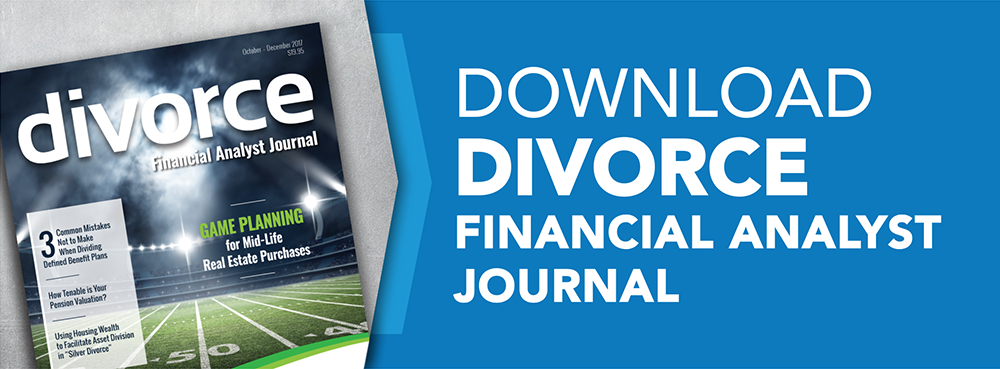Learning Objectives
CDFA candidates will study a broad range of topics regarding the financial aspects of divorce including:
Professional Responsibilities
- Knowledge of the difference between giving legal and/or tax advice and providing a financial opinion or information
- Knowledge of the difference between the role of CDFA(R) professionals and that of other financial advisors or professionals
- Knowledge of the roles of the CDFA professional and specific divorce processes
Divorce Law & Terminology
- Knowledge of common financial mistakes made in divorce settlements
- Knowledge of the different types of settlement options(e.g., alternative dispute resolution, litigation, mediation, arbitration, collaborative divorce, cooperative divorce)
- Knowledge of the purpose and content of a financial affidavit and how to prepare, review, and evaluate it.
- Knowledge of the differences between how community property states and equitable distribution states define and divide marital assets
Property and Taxation
- Knowledge of the tax impacts of dividing assets and liabilities
- Knowledge of how to identify possible marital and separate property
- Knowledge of options for the marital home in a divorce,
- Knowledge of the rules and tax implications of the sale of the marital home including ownership and use periods.
- Skill to calculate equity, cost basis, and capital gain on other real property (non-marital home)
- Knowledge of how most property transfers are taxed and exceptions relative to divorceRetirement Plans and Taxation
- Knowledge of defined contribution plans and how they work and how to transfer assets
- Knowledge of defined benefit plans and how they work
- Knowledge of different methods for dividing a pension
- Knowledge of how to calculate the present value of a defined benefit pension
- Knowledge of the need for a QDRO and how they work
Social Security and Other Government Benefits
- Knowledge of when an ex-spouse qualifies, or multiple ex-spouses, qualify for Social Security retirement, spousal or survivor benefits.
- Knowledge of other divorce-related Social Security issues
- Knowledge of government-based health care programs
Spousal and Child Support Taxation
- Knowledge of how, when and why spousal support can be modified
- Knowledge of how, when, and why child support can be modified
- Knowledge of the assignment of child dependency and related issues
- Knowledge of the history of spousal support taxation
Financial Analysis and Planning
- Knowledge of the information needed to analyze client financial data
- Knowledge of how to read and interpret the client’s financial information
- Knowledge of how to look for missing and/or inconsistent financial information
- Knowledge of various tax credits
Insurance and Risk Management
- Knowledge of various methods for protecting spousal support, including life insurance, disability insurance, or an annuity
- Knowledge of life insurance and its use in divorce, including ownership designations
Employee Benefits
- Knowledge of executive compensation(e.g., qualified and nonqualified stock options, restricted stock units, performance units, deferred income)
- Knowledge of health insurance and benefits governed by the Consolidated Omnibus Budget Reconciliation Act (COBRA)
- Knowledge of health savings accounts (HSAs)and flexible spending accounts (FSAs), and how they are taxed.
Debt, Credit, and Bankruptcy
- Knowledge of the rules regarding secured debt, student loan debt, unsecured debt, and tax debt and how to classify debt as marital or separate
- Knowledge of how credit and debt work in divorce and potential post-divorce liability
- Knowledge of loans on insurance politics and 401(k) plans
Specialty Areas
- Knowledge of the financial implications of pre-nuptial and postnuptial agreements
- Knowledge of the financial implications for spouses and/or children with special needs
- Knowledge of issues related to late-life divorce (e.g., retirement benefits, disability, long-term care needs)
- Knowledge of issues related to military divorces

 800.875.1760
800.875.1760







